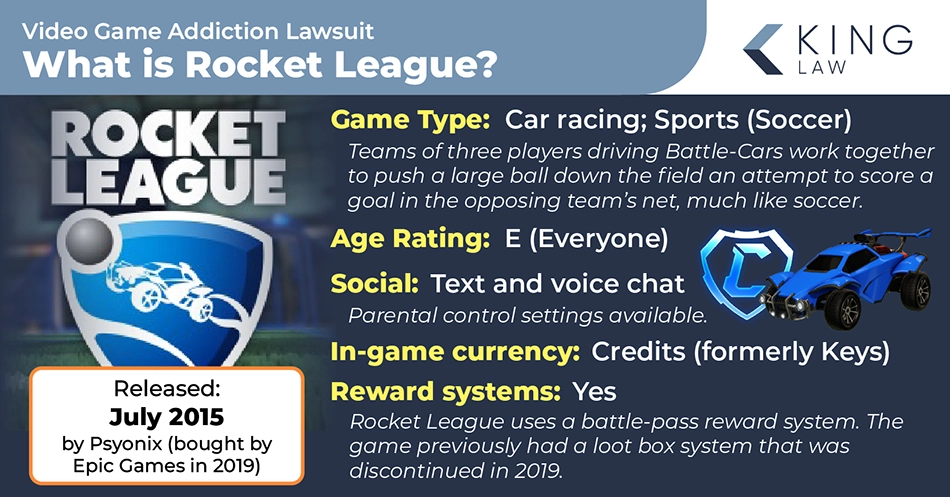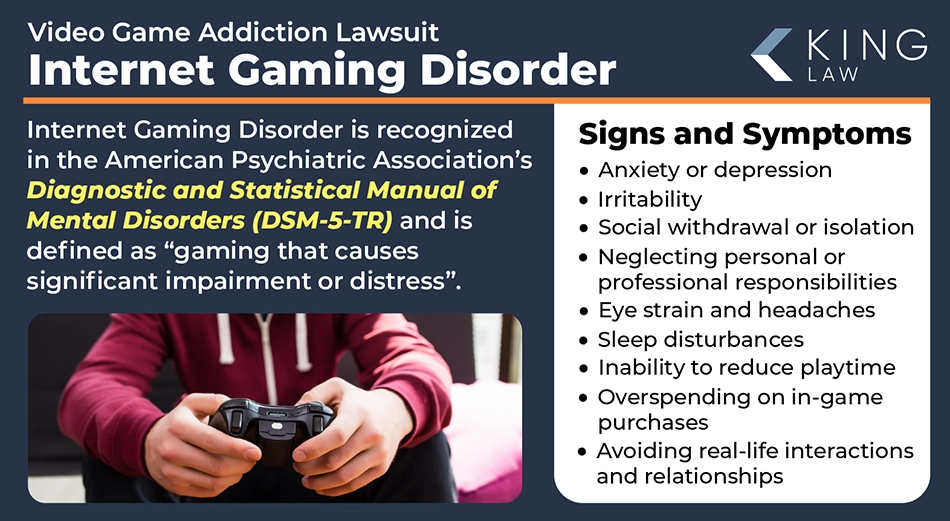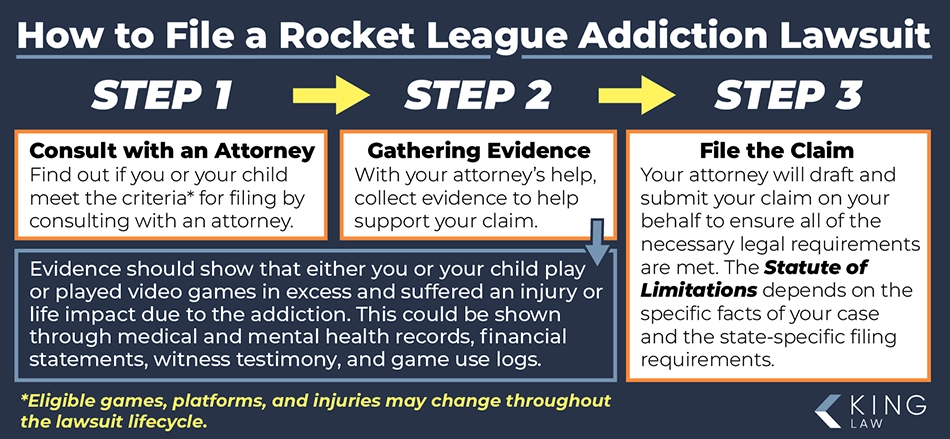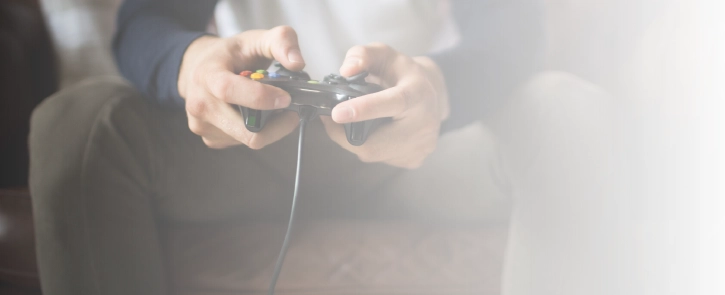
Rocket League Lawsuit – April 2025 Update
People are filing video game addiction lawsuits alleging playing Rocket League led to serious mental and physical health issues, including gamer’s rage, depression, anxiety, seizures, epilepsy, and oppositional defiant disorder. These lawsuits accuse Psyonix, the manufacturer of Rocket League, of not properly disclosing the potential harm associated with playing the game.
Individuals who have experienced addiction-related conditions and concerned parents say they were not properly warned about the dangers of playing the game and proper safeguards were not in place for minors. After developing adverse health issues, many people suffered financial, physical, and mental setbacks. In an effort to gain compensation for these losses, people are filing personal injury and product liability lawsuits against Psyonix and its parent company, Epic Games.
Rocket League Addiction Lawsuit 2025 Updates
March 2025: Season 18 of Rocket League Launches on March 14, Along With Numerous Features to Increase Engagement Play Time
Psyonix, the developer of Rocket League, has announced the debut of Season 18 on March 14, 2025. The game features a futuristic theme, as well as a new battle pass, a new high-tech arena, and 10 new Mutators. New releases and features are typically used to drive play engagement and attract new players. Many of the features are accused of being purposefully addictive and have led young people and parents to file lawsuits against Psyonix and other developers.
February 2025: Additional Addiction Lawsuits Expected to be Filed Against Epic Games
Due to the widespread popularity of games like Rocket League, additional addiction lawsuits are expected to be filed against Psyonix and its parent company, Epic Games. Legal documents accuse the game developers of failing to warn consumers about the dangers of using their products.
December 2024: Study Discusses Effects of “Too Much Gaming”
A Harvard Health study discussed the effects of too much gaming, including physical injuries such as repetitive stress injuries and the psychological effects of excessive gaming. Some of the adverse health conditions include those similar to what a gambler or addict may experience.
August 2024: Study Finds Increased Risk of Verbal Aggression Among College Students with Gaming Addiction
A study of 252 university students (50.79% male) found an increased risk of verbal aggression among students with gaming addiction. The study reinforces the idea that excessive gaming can have adverse effects on a person’s behavior.
April 2024: Gaming Disorder Recognized by World Health Organization
“Gaming Disorder” was recognized by the World Health Organization, which noted that the disorder was listed in the 11th Revision of the International Classification of Diseases (ICD-11). Symptoms of the disorder include impaired control over gaming and escalation of gaming despite negative consequences.
January 2024: Initial lawsuits filed against video game manufacturers alleging addiction
In the fall 2023, lawsuits were filed against video game manufacturers alleging their games were intentionally designed to be addictive and targeted vulnerable populations, including adolescents. Studies show that addiction-related conditions such as depression, anxiety, gamer’s rage, and other adverse health issues may be caused by excessive gaming.
About Rocket League:
What Is Rocket League and How Does the Video Game Work?
How Does Rocket League Encourage Addictive Behaviors?
What Are the Most Addictive Features in Rocket League?
Signs and Symptoms of Addiction to Rocket League
Who Is Eligible to File a Rocket League Addiction Lawsuit?
How to Gather Evidence for a Rocket League Addiction Lawsuit
What Damages Can Be Recovered in a Rocket League Addiction Lawsuit?
How to File a Rocket League Addiction Lawsuit
Rocket League Lawsuit Settlement Amounts
Statute of Limitations for a Rocket League Lawsuit
What Is Rocket League and How Does the Video Game Work?
Rocket League is a unique arcade-style game that combines vehicular mayhem with the fast-paced world of soccer. It was developed in 2015 by the video game company Psyonix. The game can be played on a number of different platforms, including Nintendo Switch, PlayStation 4, Microsoft Windows, MacOS, and Xbox One.
- Battle-car: Players begin by selecting a battle-car. Each battle-car offers a number of customizable features. There are approximately 95 battle-cars. Players are initially able to select from a handful of standard vehicles, before they unlock additional options by playing games. Some cars are considered rare, limited, or premium and must be purchased.
- Skillset: To win games, players must develop skills like aerials and feathering which provides a boost during the aerial. These skills can be developed by doing free play or training packs.
- Team-based gameplay: The battle-cars become soccer mates on the field and compete against each other in teams to score goals. Players can rank up to levels such as gold, platinum, or even Grand Champion.
The game allows for cross-platform progression and offers tournaments throughout each season. The game is popular in the realm of Esports, where professional and amateur players face off in competitions. Limited-time offers and frequent updates encourage prolonged gameplay, while the ability to fully customize vehicles and modes of play creates an immersive experience for each user.

How Does Rocket League Encourage Addictive Behaviors?
Rocket League encourages addictive behavior through certain elements and features that make users want to keep playing either because they hope to achieve higher rankings or because of the dopamine release that is triggered within their brains. It is alleged that game developers intentionally designed the game with these elements in order to entice prolonged gameplay.
Potentially addictive features in Rocket League:
- In-game rewards: Variable rewards entice players to continue playing. Studies show that these rewards may trigger a dopamine release, which activates the brain’s pleasure system. Users play longer to experience additional rushes. In Rocket League, players can purchase premium battle-cars, cosmetic upgrades, player banners, and more. Many of these are on limited-time offers, such as featured items (48-hour timer) and daily items (24-hour timers).
- Arcade-style gameplay: The unique arcade-style, sports-hybrid 3v3 gameplay keeps users immersed in a fantasy world of fast-paced competition. Now in its 18th season, the game is well-developed with numerous modes such as Slip Shot, which divides teams across each half of the pitch.
- Competitive rankings: Competitive rankings where players can obtain achievements increase the likelihood that users will continue to play and possibly play excessively. Players achieve new rankings by playing and winning matches. Competitive ranks begin at bronze awards and move up through silver, gold, platinum to grand champion and beyond.
- Limited-time offers: Limited-time offers create a sense of urgency, encouraging players to log on more frequently. In addition to featured and daily items, Psyonix also offers free and premium rewards for limited time periods during release of a new season.
- Social interaction: Social interactions available on the game may encourage peer pressure or players to play despite consequences for fear of missing out. Rocket League’s new “community spotlight” allows users to visit the Item Shop to claim a title related to a well-known person in the community.
Microtransactions: Users often express remorse over excessive spending on in-game purchases. These purchases include cosmetic upgrades, booster packs, and other add-ons. Players may select the premium path to obtain higher value items that may help them secure victory with their battle-cars.
What Are the Most Addictive Features in Rocket League?
Rocket League is an arcade-style, sports-hybrid game that shot to popularity after its release. It is alleged that certain aspects of the game were intentionally designed to be addictive. Individuals who experience addiction-related conditions after playing Rocket League are encouraged to seek legal counsel.
Most addictive features in Rocket League:
- In-game events and limited-time offers: In-game events and limited-time offers give players a sense of urgency to play and encourage prolonged sessions.
- Competitive rankings: Players compete to achieve higher rankings, encouraging excessive gaming. Rocket League players begin at Bronze and may achieve rankings such as Gold, Platinum, Grand Champion, or Supersonic Legend.
Arcade-style gameplay: The unique arcade-style and sports-hybrid gameplay keep users engaged and immersed in the game. Players select battle-cars to play in a solo standard or 3v3 soccer match. The match is played among an arcade-like background.
Signs and Symptoms of Addiction to Rocket League
Individuals and parents of adolescents playing Rocket League should be aware of the potential for addiction. It is believed that certain elements of the game were designed to be addictive, encouraging excessive gaming. If you see signs or symptoms of addiction to Rocket League, it is strongly recommended that you contact a healthcare professional as soon as possible.
Signs and symptoms of Rocket League addiction:
- Inability to reduce playing time
- Inability to stop playing
- Preoccupation with gaming
- Neglecting personal or professional obligations to play Rocket League
- Prioritizing gaming over social engagements
- Decline in work or academic performance
- Sleep disturbances
- Eye strain or headaches
- Anxiety or depression
- Irritability
- Avoidance of real-life interactions
- Overspending on in-game purchases
- Social withdrawal or isolation
The American Psychiatric Association has recognized internet gaming disorder as a serious problem for many people, especially children and teens. Video game addiction can cause significant impairment to a person’s life and well-being. Teens and young people suffering from video game addiction may need specialized educational plans, in-patient counseling, and other support.

Who Is Eligible to File a Rocket League Addiction Lawsuit?
To file a Rocket League addiction lawsuit, individuals must meet certain eligibility requirements. These criteria include that the person is 25 years or younger, has a physical or mental health injury related to excessive gaming, and played Rocket League for three or more hours a day for at least 5 weeks.
Eligibility criteria for a Rocket League addiction lawsuit:
- Proof of injury: Medical or mental health records should show a diagnosis of or treatment for a gaming-related condition, including depression, anxiety, gamer’s rage, seizures or epilepsy, or oppositional defiant disorder.
- Proof of excessive playing: You must have proof that you played Rocket League for at least three hours a day for five or more weeks.
Proof of age: Individuals who started playing Rocket League prior to age 24 and experienced addiction-related conditions before the age of 25 may qualify.
How to Gather Evidence for a Rocket League Addiction Lawsuit
To file a successful Rocket League addiction lawsuit, plaintiffs must gather evidence to support their claim. Evidence, including medical records, often proves critical to strengthening a case. An attorney can help to provide guidance about the evidence that may be necessary to substantiate your claim.
Evidence necessary to support a Rocket League addiction lawsuit:
- Medical records: Medical records showing a diagnosis or treatment for a gaming-related addiction or addiction-related condition.
- Mental health evaluations: Psychological evaluations with reports about any conditions experienced as a result of excessive gaming.
- Financial statements: Financial statements showing overspending on in-game purchases or unauthorized expenses.
- Game usage logs: Usage logs or screenshots evidencing the length and duration of gaming sessions.
- Expert testimony: Expert opinion about the game’s addictive elements and the impact it may have on users.
- Witness statements: Statements from friends, family members, coworkers, or teachers about the impact gaming and any related conditions have had on your quality of life.
- Academic records: Records indicating a decline in academic performance.
Work evaluations: Performance evaluations showing a decline in work or missed days on the job.
What Damages Can Be Recovered in a Rocket League Addiction Lawsuit?
Recoverable damages in a Rocket League addiction lawsuit depend on the individual circumstances of the case. In most cases, plaintiffs may be eligible for compensation for both economic and non-economic losses. However, it is critical to consult with an attorney about the potential value of the case and what damages you may be able to recover.
Recoverable damages in a Rocket League addiction lawsuit:
- Medical expenses: Plaintiffs may be eligible for past and future medical expenses, including those related to therapy, counseling, and addiction treatments.
- Lost wages: Individuals may be able to receive compensation related to lost wages and future loss of income.
- Academic support: Losses related to academic decline, including tutoring or alternative schooling.
- Attorney’s fees and court costs: Individuals may be able to recover attorney’s fees and court costs.
- Reimbursement for in-game purchases: Individuals may be entitled to reimbursement if the addiction-related condition resulted in overspending on in-game purchases.
In addition to compensatory damages, plaintiffs may be eligible for non-economic damages such as pain and suffering and diminished quality of life.
How to File a Rocket League Addiction Lawsuit
There are several steps to file a Rocket League addiction lawsuit. Following the proper legal process is often critical to ensure a successful outcome in your case. An attorney can provide the guidance and resources you may need throughout your lawsuit.
Steps to file a Rocket League addiction lawsuit:
- Consult with an attorney: The first step in a Rocket League addiction lawsuit is to consult with a qualified attorney. An attorney will review your claim to ensure you meet the eligibility criteria necessary to take legal action. They can also help you navigate the legal process and ensure a proper filing of the claim.
- Gather evidence: With the assistance of your attorney, you will need to gather the evidence necessary to support your claim. Evidence may include a comprehensive set of your medical records, financial statements, mental health evaluations, expert testimony, witness statements, and game usage logs.
- File the claim: With the necessary evidence collected, your attorney will then file the claim in the appropriate courthouse. Before filing, your attorney will ensure that all legal requirements are met, including that the case is filed within the state-specific statute of limitations.

Rocket League Lawsuit Settlement Amounts
While Rocket League addiction lawsuits are in their early stages, it is estimated that settlements could range between $100,000 and $300,000 per person. In some cases, claims may have the potential to exceed $300,000. Influencing factors in a lawsuit may include the severity of the damages and the amount of verifiable damages.
Statute of Limitations for a Rocket League Lawsuit
The statute of limitations in a Rocket League lawsuit varies by state and may range between 1 and 6 years. Due to the complexities involved with the legal deadlines in a video game addiction lawsuit, it is important to consult with an attorney as soon as possible. Failure to file within the statute of limitations may result in your claim for compensation being denied.
Contact a Rocket League Addiction Lawyer
If you or your child experienced addiction-related conditions after playing Rocket League, you may be eligible to take legal action against the manufacturer. It is important to consult with an attorney as early in the process as possible to determine whether you meet the eligibility requirements. During your initial consultation, the attorney will review your claim and work with you to assess the best possible course forward.

